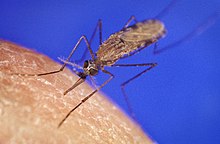Draft:Body odor and mosquito attraction
| Submission declined on 8 May 2024 by Xoak (talk). This submission reads more like an essay than an encyclopedia article. Submissions should summarise information in secondary, reliable sources and not contain opinions or original research. Please write about the topic from a neutral point of view in an encyclopedic manner.
Where to get help
How to improve a draft
You can also browse Wikipedia:Featured articles and Wikipedia:Good articles to find examples of Wikipedia's best writing on topics similar to your proposed article. Improving your odds of a speedy review To improve your odds of a faster review, tag your draft with relevant WikiProject tags using the button below. This will let reviewers know a new draft has been submitted in their area of interest. For instance, if you wrote about a female astronomer, you would want to add the Biography, Astronomy, and Women scientists tags. Editor resources
|  |
 Comment: Also, I'm unsure if a separate article is needed for such a topic. It could or is subtly mentioned in the relevant pages already. X (talk) 18:56, 8 May 2024 (UTC)
Comment: Also, I'm unsure if a separate article is needed for such a topic. It could or is subtly mentioned in the relevant pages already. X (talk) 18:56, 8 May 2024 (UTC)

Research has found that mosquitoes are attracted to certain chemicals in body odor. In particular, airborne carboxylic acids produced by skin bacteria can attract mosquitoes while eucalyptol can act as a repellent.[1] The effect of body odor on mosquito attraction also depends on the type of mosquito — malarial mosquitoes exhibit heightened sensitivity to human body odor compared to non-malarial mosquitoes, possibly due to alterations in their olfactory system caused by the malaria parasite.[2] Infected mosquitoes are around three times more likely to be attracted to and attempt to feed on humans than uninfected mosquitoes.
Human body odor[edit]
All humans possess three types of sweat glands, including the apocrine, eccrine, and sebaceous glands. The apocrine glands, which develop and activate in hairy regions during puberty, produce an odorless oily fluid known as sweat. It is only when skin microbes – which tend to thrive in moist and warm environments – metabolize the sweat that it can produce an odor. The use of deodorants or antiperspirants can mask this unpleasant odor that emanates from the body.
Mosquitoes and body odor[edit]
Several of the chemicals found within body odor can be smelled by mosquitoes, creating a greater attraction to certain individuals over others. Extensive research has been conducted to pinpoint the specific chemicals that attract mosquitoes. One experiment, published in the Current Biology Journal, involved building an ice-rink-size testing arena full of mosquitoes and pumping in the scents of different people[1]. While the researchers' main goal was to compare the mosquitoes' smell preferences across different humans, they were also interested in gaining more data regarding the insects' ability to track scents across large distances, as well as how the time of day affected their activity. The researchers were able to track which scents were of greatest interest to the mosquitoes. The study found that the mosquitoes were most attracted to airborne carboxylic acids, which are produced by bacteria on human skin and whose smell tends to not be noticeable to humans[1]. Additionally, the researchers discovered that a chemical called eucalyptol, which can be found in plants, tends to deter these insects[1]. Humans whose diet includes a large portion of vegetables may produce a lot of eucalyptol in their body odor, which could help them not attract mosquitoes.
Malarial and non-malarial mosquitoes[edit]
A 2013 study compares and contrasts the sensitivity levels of those mosquitoes carrying the malaria disease and those that are not. Researchers found that malarial mosquitoes are more sensitive and more attracted to humans' body odor than non-malarial mosquitoes.[2]. They hypothesized that this is due to the parasite creating an alteration somewhere in the mosquitoes' olfactory system that allows them to smell and find humans in a faster manner. In fact, the data in the study suggests that mosquitoes infected with the malaria parasite, Plasmodium falciparum, were around three times more likely to land and attempt to feed on the test fabric than uninfected mosquitoes[2]
References[edit]
- ^ a b c d Giraldo, D.; Rankin-Turner, S.; Corver, A.; Tauxe, G. M.; Gao, A. L.; Jackson, D. M.; Simubali, L.; Book, C.; Stevenson, J. C.; Thuma, P. E.; McCoy, R. C.; Gordus, A.; Mburu, M. M.; Simulundu, E.; McMeniman, C. J. (2023). "Human scent guides mosquito thermotaxis and host selection under naturalistic conditions - ScienceDirect". Current Biology : Cb. 33 (12): 2367–2382.e7. doi:10.1016/j.cub.2023.04.050. PMC 10824255. PMID 37209680.
- ^ a b c Smallegange, Renate C.; Gemert, Geert-Jan van; Vegte-Bolmer, Marga van de; Gezan, Salvador; Takken, Willem; Sauerwein, Robert W.; Logan, James G. (May 15, 2013). "Malaria Infected Mosquitoes Express Enhanced Attraction to Human Odor". PLOS ONE. 8 (5): e63602. Bibcode:2013PLoSO...863602S. doi:10.1371/journal.pone.0063602. PMC 3655188. PMID 23691073.
